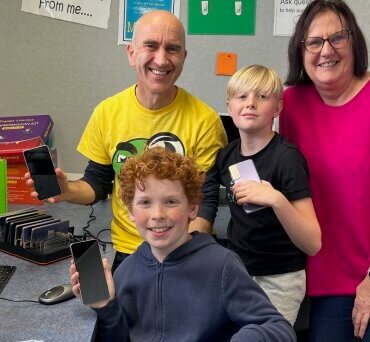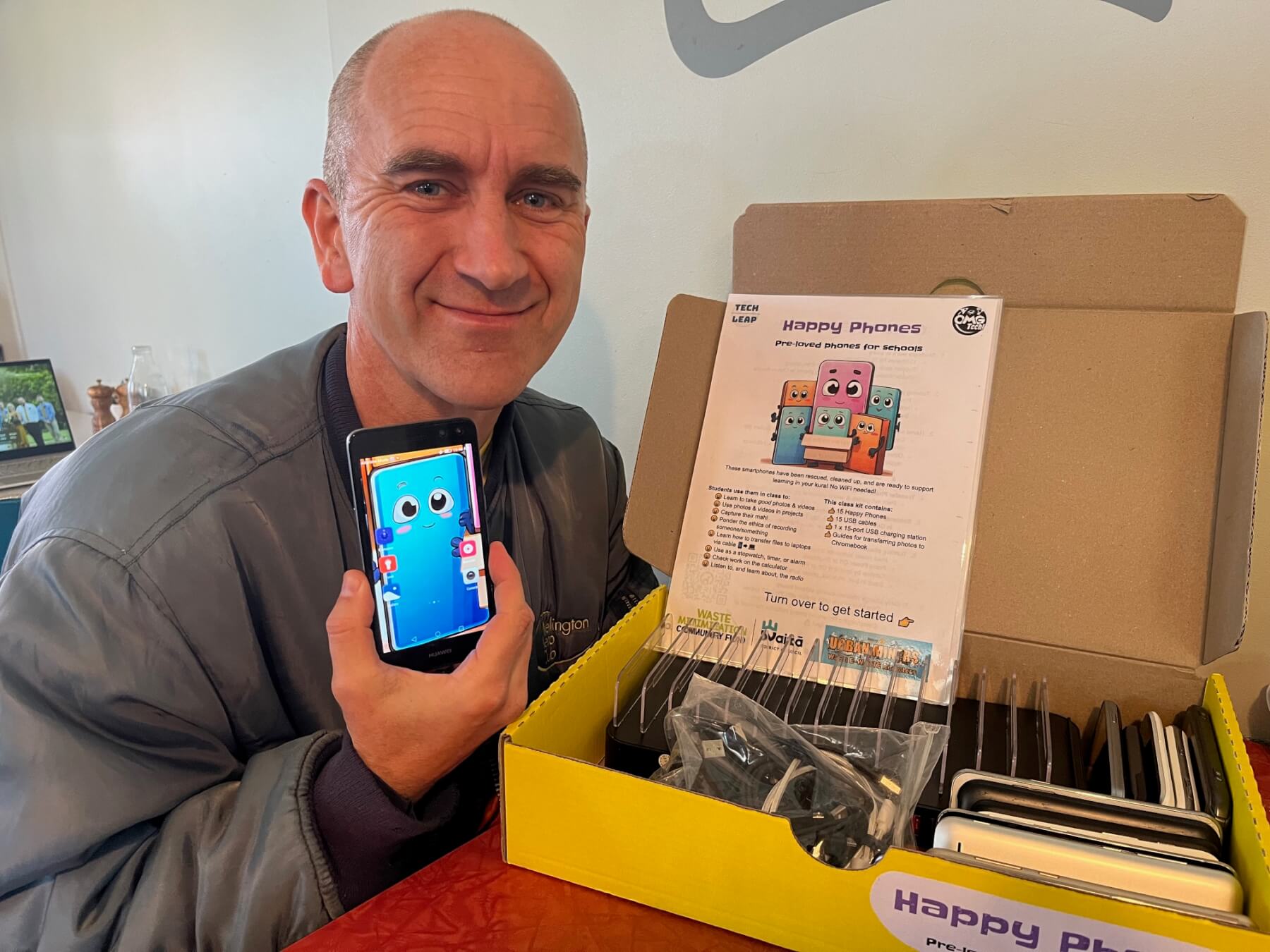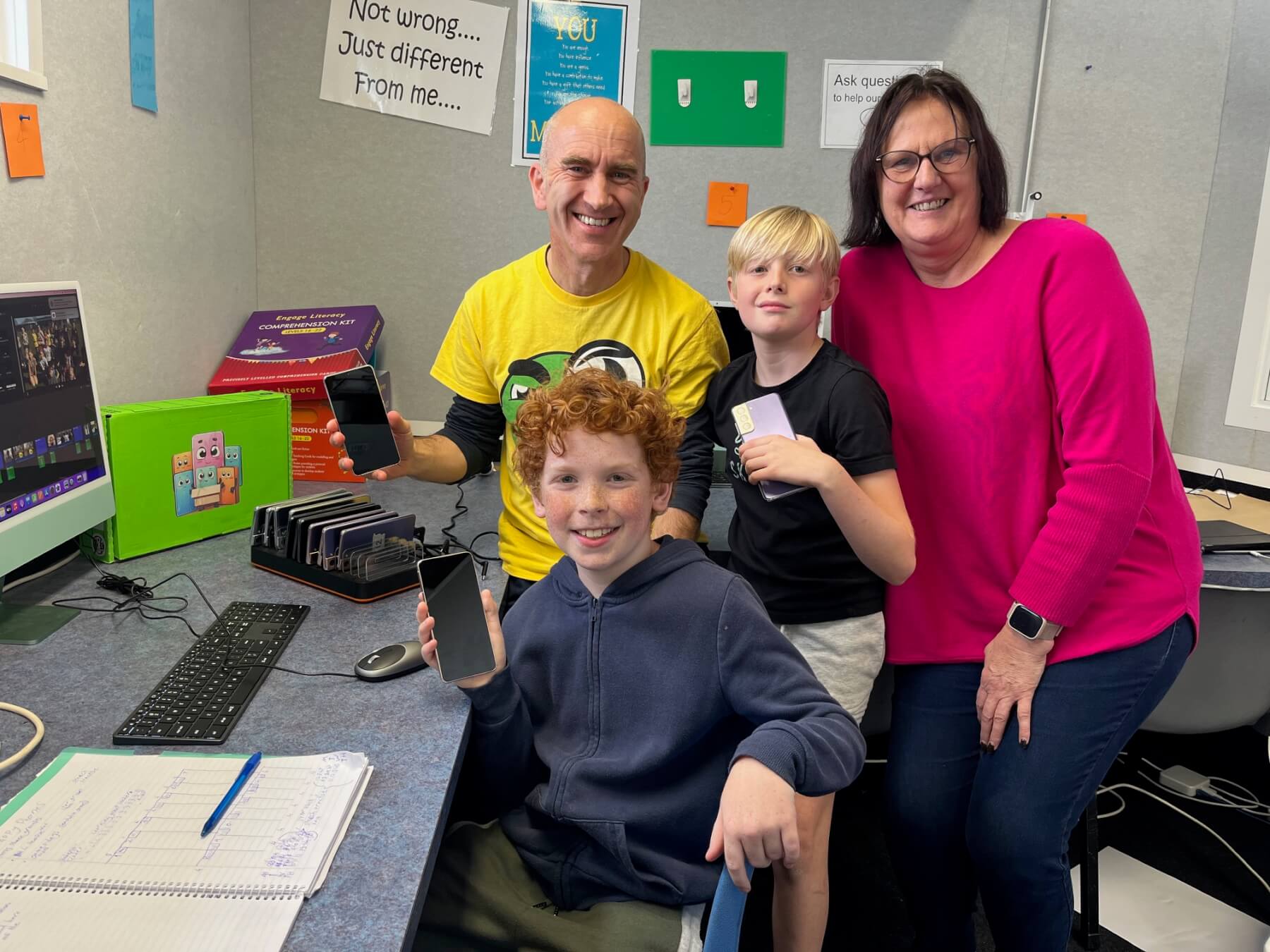
Geoff Bentley and Cambridge East Primary’s assistant principal and Year 5/6 teacher, Kathy McIsaac, with two of the youngsters
A ‘Happy Phones’ initiative that sees school students use repurposed old mobile phones in ways that expand their learning platforms is winning fans at Cambridge East Primary School.

Geoff Bentley with one of the ‘Happy Phones’ classroom kits gaining popularity in local schools. Photo: Viv Posselt
Students have been using the pre-loved phones to take photos on field trips or film each other doing presentations or making speeches. They’re now busy filming snippets of daily life at their school for students of a similar age at a school they partner with in Japan.
It’s helping the children become digitally savvy in a safe environment. They are able to share what they’re doing at school with parents and get extra-creative as they come up with ideas on different ways to use them.
The ‘Happy Phones’ initiative is the brainchild of Waipā digital and sustainable tech educator Geoff Bentley. Impressed by what he saw when volunteering with the e-waste recycling project run by Rotary Cambridge, Urban Miners, he figured there had to be a better after-life for old phones than was evident through his efforts to rescue and refurbish mobile phones and tablets for sale at Cambridge Lions’ Trash & Treasure Market.
“Older phones were not selling well at the market, but I knew that these devices were still useful. I had an idea that they could be used in school classrooms and field trips, giving students the ability to take photos and videos and use them in projects,” he said.
He kicked off with the Happy Phones idea in 2022, and after securing funding from Waipā District Council, conducted trials with three schools in the second term of last year. He followed that by doing further testing with five schools in term three … the feedback was all positive.
The project’s success has led to additional funding coming in from Technology Education New Zealand to create ‘Happy Phones DIY’, a step-by-step guide to support school communities around the country.
“I realised that this was something other communities could do, and with the 3G shutdown happening in 2025, there will be millions of phones discarded as people upgrade. E-waste is a huge problem in New Zealand, and this is part of the solution.”
Bentley rescues and cleans up the old smartphones, then configures them for use in schools. He packages them into class kits available for hire to schools. Each kit contains 15 Happy Phones, 15 USB cables, one 15-port USB charging station, lesson plans, user guides and resources aimed at different age groups.
The phones aren’t connected to a network and are under teacher control when being used – so they are unaffected by student cell phone bans. By having them available, students can learn how to take good photographs and videos, create their own podcasts, learn how to transfer files to a computer and learn basic video and photo editing skills.
Bentley ducked into Cambridge Primary recently to see how they were being used. Assistant principal and Year 5/6 teacher, Kathy McIsaac, and Year 3/4 teacher Renae Townsend both said the phones were being increasingly used in ways that expanded the ways students could learn and got them thinking creatively.
Some of the older students are launching into a new relationship with a Japanese school and have plans to regularly share videos of their schools and activities. Use of the phones is being incorporated into various learning areas with students also coming up with novel suggestions of their own.
Bentley said most phones are used for only around three years before being recycled or tossed in the rubbish.
“This is a massive waste of energy and resources. The best thing we can do is extend the life of our phones.”

Geoff Bentley and Cambridge East Primary’s assistant principal and Year 5/6 teacher, Kathy McIsaac, with two of the youngsters helping with phone use in the classroom – Connor Button and Paxton Schoppe. Photo: Viv Posselt








